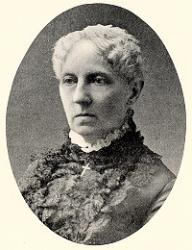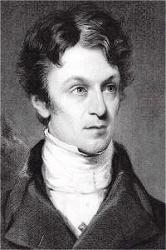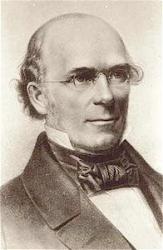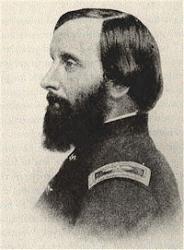Planning worship?
Check out our sister site, ZeteoSearch.org,
for 20+ additional resources related to your search.
- |
User Links
Person Results
‹ Return to hymnal





Export as CSV
Caroline A. Mason

1823 - 1890 Hymnal Number: d160 Author of "I cannot walk in darkness long" in Unitarian Service Book, and Hymns for Church and Home. Abridged ed. Mason, Caroline Atherton, née Briggs, daughter of Dr. Calvin Briggs, of Marblehead, b. there July 27, 1823, married Charles Mason, a lawyer at Fitchburg, in 1853, and d. there June 13, 1890. She published a volume of poems as Utterance: or Private Voices to the Public Heart, 1852. Her Lost Ring and other Poems was issued in 1891. Of her hymns the following are in common use:—
1. I cannot walk in darkness long. [Evening.] This begins with st. v. of her poem on eventide, "At cool of day with God I walk." In her Lost Ring, 1891, p. 165.
2. 0 God. I thank Thee for each sight. [The Joy of Living.] From her Lost Ring, Dec, 1891, p. 164, where it is entitled "A Matin Hymn," and begins "I lift the sash and gaze abroad."
3. The changing years, eternal God. [Adoration.] Written for the Bicentennial of the First Cong. Church, Marblehead, Aug. 13, 1884 (Lost Ring, 1891, p. 174). It begins "The changing centuries, O God."
Of these Nos. 1 and 2 are in Putnam's Singers & Songs, 1875, pp. 464-5. [Rev. James Mearns, M.A.]
--John Julian, Dictionary of Hymnology, New Supplement (1907)
Caroline A. Mason
Eliza Scudder
1821 - 1896 Hymnal Number: d158 Author of "I cannot find thee, still on restless pinion" in Unitarian Service Book, and Hymns for Church and Home. Abridged ed. Scudder, Eliza , niece of Dr. E. H. Sears, (q.v.), was born in Boston, U.S.A., Nov. 14,1821, and now (1888) lives in Salem, Massachusetts. Formerly an Unitarian, she some time ago joined the Protestant Episcopal Church. Her hymns in common use are:—
1. From past regret and present[faithlessness] feebleness . Repentance. In the Quiet Hours, Boston, 1875.
2. I cannot find Thee! Still on restless pinion . Seeking after God. Appeared in Longfellow and Johnson's Unitarian Hymns of the Spirit, 1864.
3. In Thee my powers and treasures live. Faith.
4. Life of our life, and light of all our seeing! Prayer. In the Boston Quiet Hours, 1875.
5. The day is done; the weary day of thought and toil is past. Evening. In Sermons and Songs of the Christian Life, by E. H. Sears, Boston, 2nd ed.,1878, p. 296, entitled "Vesper Hymn," and dated "October, 1874." This is possibly her finest hymn.
6. Thou grace divine, encircling all . Divine Grace. Appeared in Dr. E. H. Sears's Pictures of the Olden Time, as shown in the Fortunes of a Family of Pilgrims, 1857. It was written in 1852, and included in the Boston Hymns of the Spirit, 1864. It has sometimes been taken as "An Ancient Catholic Hymn" (Universalist's Psalms & Hymns 1865), but in error.
7. Thou long disowned, reviled, oppresst. The Spirit of Truth. In the Boston Hymns of the Spirit, 1864.
Of these hymns, Nos. 2, 6, and 7 are in Dr. Martineau's Hymns, 1873. Some of Miss Scudder's poetical pieces appeared in Dr. Sears's Monthly Religious Magazine. Her Hymns and Sonnets, by E. S., were published by Lockwood, Brooks & Co., Boston, 1880. From this her hymn "Thou hast gone up again" (Ascension), is taken. [Rev. F. M. Bird, M.A.]
-- John Julian, Dictionary of Hymnology (1907)
====================
Scudder, Eliza, pp. 1035, L, 1589, i. Miss Scudder died in 1896. Her Hymns & Sonnets, with biographical notes, &c, by Horace E. Scudder, was published by Houghton & Mifflin, 1897. In The Pilgrim Hymnal, 1904, the hymn," Thou Life within my life," begins with st. ii. of "From past regret and present [faithlessness] feebleness," p. 1035, i. 1), which was written in Feb. 1871. Another of Miss Scudder's hymns is “ Let whosoever will enquire" (New Heaven), from which "My God, I rather look to Thee," in Horder's Worship Song, 1905, is taken.
--John Julian, Dictionary of Hymnology, New Supplement (1907)
Eliza Scudder
Minot J. Savage
1841 - 1918 Person Name: Minot Judson Savage Hymnal Number: d77 Author of "Dost thou hear the bugle sounding" in Unitarian Service Book, and Hymns for Church and Home. Abridged ed. Savage, Minot Judson, D.D., was born at Norridgewock, Maine, June 10, 1841, and educated at Bangor Seminary, where he graduated in 1864. From 1867 to 1873 he was a Congregational Minister, and then he joined the Unitarians, and has now (1900) a charge in Boston. He has published several works, including Poems, Boston, 1882. He also edited, with H. M. Dow, Sacred Songs for Public Worship, Boston, 1883, to which he contributed 46 original hymns. In hymnals other than this, of his hymns the following are in common use:—
1. Dost thou hear the bugle sounding. Consecration to Duty.
2. Father, we would not dare to change Thy purpose, &C. Prayer.
3. 0 God Whose law is in the sky. Consecration to Duty.
4. 0 star of truth down shining. Truth.
5. The God that to the fathers revealed His holy will. God unchangeable.
6. The very blossoms of our life. Holy Baptism.
7. What purpose burns within our hearts. Joining in Church Fellowship.
8. God of the glorious summer hours. New Year This is in D. Agate's Sunday S. Hymn Book, 1881, No. 371, and dated 1875. From the Sunny Side, N.Y.. 1875,p. 119.
Some of these hymns are given in Hunter's Hymns of Faith and Life, Glasgow, 1889, and recent American hymnals.
--John Julian, Dictionary of Hymnology, New Supplement (1907)
Minot J. Savage
James Martineau

1805 - 1900 Hymnal Number: d6 Author of "A voice upon the midnight air" in Unitarian Service Book, and Hymns for Church and Home. Abridged ed. Martineau, James, LL.D., D.D., born at Norwich, April 21, 1805, the son of a manufacturer and wine merchant of Huguenot descent. After four years at the Norwich grammar school, and two as a pupil of Dr. Lant Carpenter, at Bristol, and a short experience in the shops of a mechanical engineer at Derby, he entered as a Divinity student in Manchester College, York. His first ministry was at Eustace St. Chapel, Dublin [1828-32], as assistant to his cousin, the Rev. Philip Taylor. From 1832 to 1857 he was in Liverpool, as minister of the congregation meeting in Paradise St. Chapel, and from 1849 in the new Hope St. Church. In 1840 he was appointed professor of Mental and Moral Philosophy and Political Economy in Manchester New College and in 1857 followed the college to London, becoming its Principal in 1869 and resigning in 1885. On settling in London he became also minister of Little Portland St. Chapel, first in conjunction with the Rev. J. J. Taylor, and afterwards alone till his resignation in 1872. He received the degree of D.C.L. from Oxford in 1888. Died Jan. 11, 1900.
The chief of Dr. Martineau's works hitherto published are four volumes of sermons, Endeavours after the Christian Life, 2 vols., 1843 and 1847; Hours of Thought on Sacred Things, 2 vols., 1876 and 1879; Studies of Christianity, 1858; Essays Philosophical and Theological 2 vols., 1866 and 1868, collected from various Reviews; A Study of Spinoza, 1882; and Types of Ethical Theories, 2 vols., 1885, 2nd ed. 1886. These contain the substance of his teaching as a Christian minister and an expounder of a spiritual philosophy of religion. By early training and matured conviction a Unitarian of the Catholic and spiritual type, Dr. Martineau has served not only the little group of churches with which he is immediately connected, but the Church Universal by his gifts of sympathy and insight into the deepest questions of human life. He has strengthened the foundations of faith in the light of modern knowledge, and added treasures, the worth of which have yet to be fully measured, to the rich store of the devout literature of the Church.
The Catholic spirit and deeply Christian temper impressed upon all Dr. Martineau's literary work give their distinctive character to the three hymn-books which he has edited, viz.:—
(1) A Collection of Hymns for Christian Worship. Dublin: Printed for the Congregation of Eustace Street 1831. This collection of 273 hymns already clearly indicates the principles of selection afterwards to be more fully worked out. It was made for the use of a society, "whose worship is paid solely to the God and Father of our Lord and Saviour Jesus Christ," and in adopting the hymns of Dr. Watts and others, such changes are made as are required by theological consistency; but the preface pleads for a wider latitude of choice than had been usual in older selections, "bringing all the resources of lyric poetry (the poetry of the affections) into the service of religion." There are 18 hymns by Bishop Heber introduced, and special mention is made of his merit in ”first liberalizing the style of poetry designed for our churches."
During his ministry in Liverpool Dr. Martineau published:—
(2) Hymns for the Christian Church and Home. Collected and edited by James Martineau. London, 1840. This with his own congregation took the place of the old Paradise St. collection of 1815, and was quickly recognised as pre-eminent among the books in use among the non-subscribing churches.
Dr. Martineau's last collection was:—
(3) Hymns of Praise and Prayer, collected and edited by James Martineau, LL.D., D.D. “Vatum suspiria solatium Ecclesiae." London, 1873.
Dr. Martineau's own hymns:—
1. A Voice upon the mid-night air. Good Friday
2. Thy way is in [on] the deep, 0 Lord. Trust.
3. "Where is your God?" Inward witness of God.
They have been hitherto published anonymously, but the authorship is now acknowledged. Nos. 1, 2, appeared first in his Hymns, &c, 1840, and 3 in his Hymns, &c.,1873. They are also found in other collections in Great Britain and America. [Rev. Valentine D. Davis, B.A.]
-- John Julian, Dictionary of Hymnology (1907)
James Martineau
Stephen Greenleaf Bulfinch

1809 - 1870 Hymnal Number: d152 Author of "How glorious is the hour" in Unitarian Service Book, and Hymns for Church and Home. Abridged ed. Bulfinch, Stephen Greenleaf, D.D. This Unitarian minister was born at Boston, June 18, 1809, and removed to Washington in 1818, his father being the architect of the Capitol. He graduated at Columbian College and the Cambridge Theological School. In 1831 lie was ordained at Charleston, S.C., as assistant to Dr. Gilman. Subsequently he was pastor at Pittsburg, Pennsylvania; Washington, 1838; Nashua, New Hampshire, 1845; Dorchester, Mass., 1852; and "East Cambridge, Mass., 1865. He died at the last place, Oct. 12, 1870. His works include:—
(1) Contemplations of the Saviour; A Series of Extracts from the Gospel History, with Reflections and Original and Selected Hymns. Boston, Carter and Hendee, 1832. This has been reprinted in England. (2) Poems, Charleston, S.C., 1834. (3) Lays of the Gospel, 1845. In addition to these works, which contain his original hymns, he also published (4) The Harp and Cross, a selection of hymns, in 1857.
Those of his hymns which have attained ta the greatest popularity are:—
1. Hail to the Sabbath day. Sunday. In the Contemplations, &c, p. 45. It is appended to Sect. xii. on the “Walk through the corn¬fields," and is in 5 stanzas of 4 lines. It is in extensive use both in Great Britain and America, and is the best known of this author'ess hymns. In many collections it begins with st. ii., " Lord, in Thy [this] sacred hour."
2. Hath not thy heart within thee burned? Presence of Christ. In the Contemplations, &c, p. 148, as the accompanying hymn to the Reflections on Jesus appearing to His disciples on their way to Emmaus, It is in 5 stanzas of 4 lines and is given in the Collections of Beard, Martineau, and others in Great Britain.
3. 0 suffering friend of human kind. Passiontide. The hymn in 4 stanzas of 4 lines appended to Sect. xxxv. on "Peter's confession of Christ," in the Contemplations, &c, p. 109. It ranks next in popularity to ”Hail to the Sabbath day."
In addition to these hymns which best represent Dr. Bulfinch's power? as a sacred poet, the following are also in limited use:—
4. Burden of shame and woe. Crucifixion.
5. Holy Son of God most high. Miracles of Christ.
6. How glorious is the hour. The New Life.
7. It is finished! Glorious word. Good Friday.
8. There is a strife we all must wage. Life's Duty. These are from his Poems, 1834. The next—
9. What power unseen by mortal eye. Cure of Nobleman's Son. From the Contemplations, &c, p. 56.
10. In the Saviour's hour of death. Good Friday. Also from the Contemplations, p. 142:
Dr. Bulfinch's hymns were made known to English readers through Beard's Collection, 1837, in which 19 were given. His hymns throughout are noted for solid and tranquil piety, and deserve a wider circulation than has been accorded to them. They embrace some good hymns on the miracles of Christ. [Rev. F. M. Bird, M.A.]
-- John Julian, Dictionary of Hymnology (1907)
====================
Bulfinch, Stephen Greenleaf, p. 191, ii. Several of this authors hymns, not noted in this Dictionary, were given in Longfellow and Johnson's Book of Hymns , 1846-8. Additional hymns by him in English common use are:—
1. Benignant Saviour! 'twas not Thine. The Compassion of Christ . From his Contemplations of the Saviour , &c, 1832. In Horder's Congregational Hymns. 1884, it reads “Most gracious Saviour! 'twas not Thine."
2. We gather to the sacred board. Holy Communion. This in Horder is from Bulfinch's Communion Thoughts, 2nd ed., 1852.
--John Julian, Dictionary of Hymnology, Appendix, Part II (1907)
Stephen Greenleaf Bulfinch
Theodore Parker

1810 - 1860 Hymnal Number: d325 Author of "O thou great Friend to all the sons of men" in Unitarian Service Book, and Hymns for Church and Home. Abridged ed. Parker, Theodore, M.A., was born at Lexington, Massachusetts, Aug. 24, 1810; laboured with his father as a farmer and mechanic; entered Harvard College in 1830, but continued his work at home and attended the College for examinations; attended the Divinity School from 1834 to 1836, and became pastor of the Unitarian congregation in West Roxbury, June 21, 1837. He received the degree of M.A. from his College in 1840. Changes in his theological views led him to undertake the pastorate of a congregation in Boston, in January 1846. He continued his writing, preaching, and lecturing till 1859, when bleeding at the lungs compelled him to seek relief in Europe. He died at Florence, May 10, 1860. His publications were numerous, and have been republished in Great Britain. An extended list is given, together with 12 poetic pieces, in Putnam's Singers and Songs of the Liberal Faith, Boston, U. S. A., 1875. His life has been published by Weiss, and by Frothingham. A few of his poetical pieces are given in American Unitarian hymn-books.
These include :—
1. In darker days and nights of storm. Almighty Love. "Introduced in a sermon which Mr. Parker preached, entitled ‘The Practical Effects of the Ecclesiastical Conception of God.’”
2. 0 Thou great Friend of all the sons of men. Jesus the Way, the Truth, and the Life. This in the original is a sonnet. Altered for use as a hymn, it is widely used by American Unitarian; and is also given in some English hymnbooks.
-- John Julian, Dictionary of Hymnology (1907)
Theodore Parker
Bradford Torrey
1843 - 1912 Hymnal Number: d241 Author of "Not so in haste my heart, have faith in God and wait" in Unitarian Service Book, and Hymns for Church and Home. Abridged ed.
Bradford Torrey
Joseph Anstice
1808 - 1836 Hymnal Number: d292 Author of "O Lord, how happy should [would] we [I] be" in Unitarian Service Book, and Hymns for Church and Home. Abridged ed. Anstice, Joseph , M.A., son of William Anstice of Madeley, Shropshire, born 1808, and educated at Enmore, near Bridgwater, Westminster, and Ch. Church, Oxford, where he gained two English prizes and graduated as a double-first. Subsequently, at the ago of 22, he became Professor of Classical Literature at King's College, London; died at Torquay, Feb. 29, 1836, aged 28. His works include Richard Coeur de Lion, a prize poem, 1828; The Influence of the Roman Conquest upon Literature and the Arts in Rome (Oxford prize Essay); Selections from the Choice Poetry of the Greek Dramatic Writers, translated into English Verse, 1832, &c. His hymns were printed a few months after his death, as:— Hymns by the late Joseph Anstice, M.A., formerly Student of Christ Church, Oxford, and Professor of Classical Literature, King’s College, London, Bridgwater, 1836, and thus introduced:—
"As none of the following Hymns had the advantage of being corrected and prepared for the press by their lamented Author, his family have not considered themselves at liberty to bring them before the public; but, having reason to believe that a large circle of surviving friends will be gratified by possessing a memorial of the manner in which some of his leisure hours were employed, and of the subjects which chiefly occupied his thoughts, during the last few months of his life, they have consented to their being printed for private distribution.—-Bridgwater, June, 1836."
This work contains 52 hymns on various subjects, together with a poem "To my Hymn Book." The circumstances under which they were written are thus detailed by Mrs. Anstice in a communication to the Rev. Josiah Miller, author of Singers and Songs of the Church:—
"The hymns were all dictated to his wife during the last few weeks of his life, and were composed just at the period of the day (the afternoon) when he felt the oppression of his illness—all his brighter morning hours being given to pupils up to the very day of his death."-—S. & S., p. 495.
A few of the hymns are of a joyful character, but the circumstances under which they were written account for the prevailing tone of sadness by which they are chiefly characterized. About one half of these hymns were included by Mrs. Yonge in her Child's Christian Year, 1841. Being thus brought before the public, many soon came into common use. Those in most extensive use are: "Father, by Thy love and power;" "In all things like “Thy brethren, Thou;" "Lord of the harvest, once again;" and, "O Lord, how happy should we be."
-- John Julian, Dictionary of Hymnology (1907)
Joseph Anstice
Thomas W. Higginson

1823 - 1911 Hymnal Number: d237 Author of "No human eyes thy face may see" in Unitarian Service Book, and Hymns for Church and Home. Abridged ed. Higginson, Thomas Wentworth, M.A., was born at Cambridge, U.S.A., Dec. 22, 1823, and educated at Harvard. From 1847 to 1850 he was Pastor of an Unitarian Church at Newburyport, and from 1852 to 1858 at Worcester. In 1858 he retired from the Ministry, and devoted himself to literature. During the Rebellion he was colonel of the first negro regiment raised in South Carolina. In addition to being for some time a leading contributor to the Atlantic Monthly, he published Outdoor Papers, 1863; Malbone, 1869; and other works. During his residence at the Harvard Divinity School he contributed the following hymns to Longfellow and Johnson's Book of Hymns, 1846:—
1. No human eyes Thy face may see. God known through love.
2. The land our fathers left to us. American Slavery.
3. The past is dark with sin and shame. Hope.
4. To Thine eternal arms, O God. Lent.
In the Book of Hymns these hymns are all marked with an asterisk. They, together with others by Mr. Higginson, are given in Putnam's Singers and Songs of the Liberal Faith, 1875. [Rev. F. M. Bird, M.A.]
-- John Julian, Dictionary of Hymnology
Thomas W. Higginson
John Patrick
1632 - 1695 Hymnal Number: d275 Author of "O God, we praise thee and confess" in Unitarian Service Book, and Hymns for Church and Home. Abridged ed. John Patrick, a brother of Bishop Simon Patrick, was Prebendary of Peterborough, 1685; Precentor of Chichester, 1690; and preacher at the Charter-House, in the Chapel of which he was buried on his death, in 1695. His "Psalms of David, in Metre," were much used by Presbyterians and Independents until superseded by the compositions of Watts.
----Annotations of the Hymnal, Charles Hutchins, M.A. 1872.
John Patrick


 My Starred Hymns
My Starred Hymns


